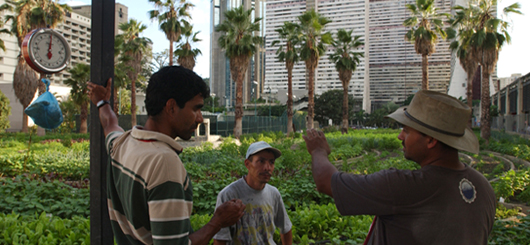Conceptual framework
By the year 2050, two-thirds of the world population will be living in urban areas; 90% of urban growth will occur in less developed regions, in East Asia, South Asia and Sub-Saharan Africa, regions that are facing an increasing number of challenges in terms of poverty reduction, increased pressure on natural resources and food security.
Within this context, the relationship between urban and rural communities becomes increasingly important, as food systems largely depend on the dynamics and activities of nearby urban centers.
Governments, planners and development agencies are now focusing on this urban-rural relationship, as sustainable urban development is fundamental to achieve the goals of the 2030 Agenda for Sustainable Development (SDGs) and the New Urban Agenda (NUA). These agendas require territorial development approaches that are integrated and inclusive, necessitating better synergies between communities and urban and rural spaces.
The creation of solidarity and strong economic links between rural and urban areas, in addition to the diversification of non-agricultural jobs in rural areas, allow for addressing challenges such as strengthening medium-sized cities, uncontrolled urban expansion, and the growing pressure on agricultural production in order to supply cities.
The territorial approach offers a holistic vision that allow for solutions to the challenges presented by modifications of the rural-urban space, taking into account the opportunities offered by local economies and rural-urban synergies.
The increasing urban development of the world population is having a serious impact on rural areas, considering the excessive demand for food and natural resources to supply growing cities. This demand is a threat to the environment and the future of rural areas. Additionally, urban expansion and the exploitation of agricultural land without adequate planning and regularization generate an increase in rural poverty.
Good governance is a prerequisite for rural-urban balance
Good governance is a prerequisite for rural-urban balance
According to the World Bank, adequate actions for rural-urban balance should be organized according to three fundamental pillars:
- planning: “urban development,” especially policies for the use of space and the rehabilitation and expansion of basic infrastructure and public services
- connecting: city markets for jobs, goods and services to make them more accessible to other cities
- financing: evaluating and developing the creditworthiness of a city, etc.
Redefining the relationships between cities and rural areas requires the implementation of policies, strategies and action plans that are integrated: a) horizontally through spatial scales; b) with the public and private sectors, civil society organizations, research and professional institutions, formal and informal civic associations; and c) vertically in different levels of commitment and decision-making.

